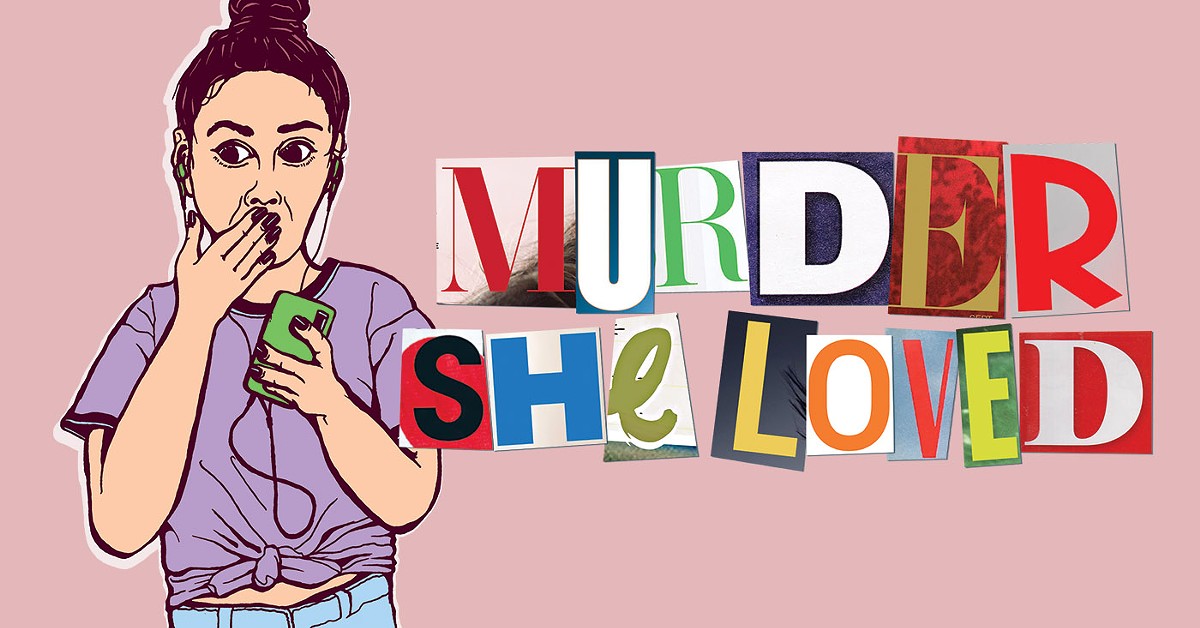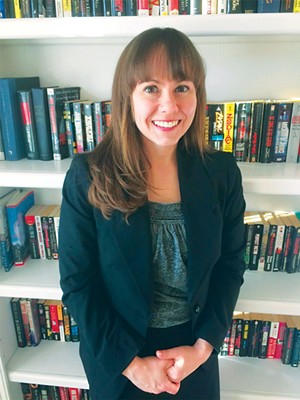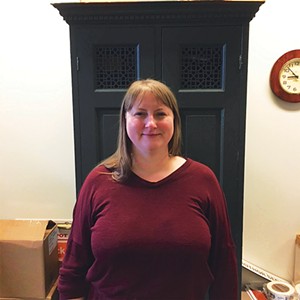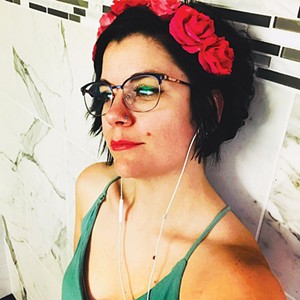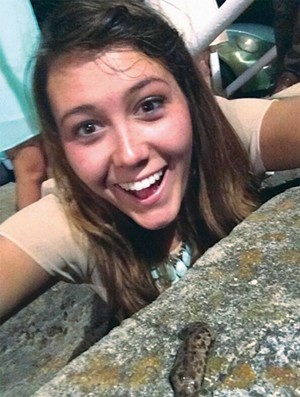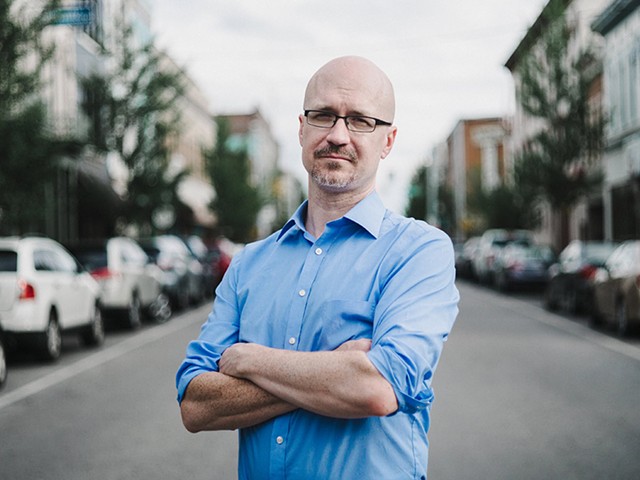The Crowd at The Brown Theatre was filled with mothers and daughters, best friends together for girls’ night out and wives escorting husbands.
“It is sooo many women,” said one audience member as she shuffled into a back row of seats for the April 19 show.
“My husband hates this podcast,” said another, already sitting down.
That evening, the show attracting so many female fans was a live taping of “My Favorite Murder,” a podcast hosted by two longtime true crime enthusiasts, Georgia Hardstark and Karen Kilgariff. They read each other stories about serial killers, abductions and disappearances — 150-proof horror that they cut with jokes and tangents about their own lives and deepest anxieties.
It isn’t just “My Favorite Murder” that’s drawing female enthusiasts.
Women, more so than men, seem to enjoy true crime books, television and shows.
A Kentucky Facebook discussion group for the podcast has over 1,000 members, 94% of whom are female.
The TV channel Investigation Discovery, the never-ending true crime factory, is the reigning top ad-supported cable network for women ages 25 to 54 in total day ratings.
And women are the primary readers of true crime — conventional wisdom in the publishing industry, said San Diego-based true crime author Caitlin Rother. It’s also backed up by a study from Illinois Wesleyan University associate professor of psychology Amanda Vicary.
Hardstark and Kilgariff have not shared their podcast’s demographics, but similar shows, “Wine and Crime” and “Sword and
Scale” have said that their audience is as much as 85 and 70 percent female.
Why?
Why are women more interested in ruminating over stories about death and torture — the worst the world has to offer?
To answer this question, I spoke with Vicary, one of the only researchers to study women’s interest in true crime, as well as Rother, who has written 10 true crime books, including “Poisoned Love” (about a case that “My Favorite Murder” also featured). I reached out to the hosts of the podcast, but, alas, their people declined. Then, I communed with some of Louisville’s female true crime disciples. The reasons they gave were varied and personal: Some said that they felt connected to the victims, or it acted as an escape from reality. But the one motivation that kept bobbing up, as if it had been floating near the surface for awhile, was the idea of self-preservation. Female true crime fans are transfixed by grisly atrocities, because they don’t want to become a victim of one.
Amanda Langdon, a 34-year-old UofL employee, has been fascinated with true crime since high school. It started with Truman Capote’s seminal “In Cold Blood” and evenings spent watching true crime shows such as “20/20.”
“We have to be always on our guard, you know?” said Langdon, who started a “My Favorite Murder” meetup in Louisville. “Part of being a woman is being aware of human psyche and the weird little tip-offs that people give you that they might mean you harm. There was a part of me that thought, ‘OK, well the more I learn, the more protected I am.’”
It’s a theory backed up by research that Vicary has done, but does it actually work? That’s another darkened avenue for exploration.
YES, WOMEN (PROBABLY) LIKE TRUE CRIME MORE THAN MEN DO
Pam Lafollette and Tracy Heitchew sat in the conference room of the South Central Regional Library — in front of them, a spread of books: “Louisville Murder and Mayhem” and “Dark Highway: Love, Murder and Revenge in 1930s’ Kentucky.”They were there for Langdon’s “My Favorite Murder” meetup (which disbanded recently). Neither Lafollette nor Heitchew listen to the podcast regularly, but they are fans of true crime, and a chance to talk about murder and mayhem is... well, a chance to talk about murder and mayhem.
Heitchew, 41, and Lafollette, 52, aren’t fully convinced that women enjoy true crime more than men. “My dad and my boyfriend both are also big true crime people,” said Heitchew, a public information specialist for the library.
Lafollette, a murder mystery author, watches true crime television with her husband; she’s content to binge five episodes, whereas he can only stomach one.
That’s consistent with Vicary’s research, a collection of studies released in 2010. “I think it’s safe to say that men also are interested in true crime, but not as much as women,” she said.
Vicary and another researcher examined book reviews for Amazon’s top 25 true crime stories. Seventy percent were written by women. To ensure that women weren’t simply the main group reviewing Amazon books, Vicary also examined 18 reviews for the website’s “new in paperback” category. The breakdown of female reviewers versus male was almost 50/50.
Vicary thinks that the conclusions of her work could be applied to podcasts and TV shows about true crime.
People, in general, are thought to be attracted to true crime, because humans get an “adrenaline rush” from being exposed to it, Vicary said. Some people enjoy the mystery and the thrill they get from trying to solve a murder on their own.
That doesn’t explain why women, more so than men, seem to be interested in true crime.
That answer might lie in fear.
REASONS FOR LIKING TRUE CRIME VARY, ONE DOMINATES
Like the audience at The Brown’s live show of “My Favorite Murder,” the crowd was mostly women at a post-show meetup at Odeon.Some wore shirts that declared “Murderino” in rainbow block letters (the name for fans of the podcast).
Haylee Hollifield, a 27-year-old from Jeffersontown, said her interest in true crime started young when she would watch “Dateline” with her mother. Hollifield was drawn to the story of JonBenét Ramsey, the 6-year-old pageant star whose mysterious death became a nationwide obsession.
“I was that age at the time,” Hollifield said, “and it just carried on throughout.”
“For me,” said Sara Dillon, 27, another “My Favorite Murder” fan, “it’s an escape.”
Sydney Clinkenbeard, a 26-year-old emergency room nurse, said the allure is self-preservation.
“It makes me feel prepared,” she said. “It makes me feel like I know so much, and nobody can touch me.”
She believes her interest in true crime saved her life.
A few years ago, on a trip to Los Angeles, she left the airport alone, looking for a ride to Disneyland. When she saw a white van with the words “Disneyland Express” on its side, she hopped in. It wasn’t until the driver told her that it was OK that she didn’t have cash that she got suspicious. “Instantly, because of true crime, I’m like, ‘No, anybody that’s not worried about getting paid, that’s a problem.”
She asked the driver to pull over so she could use an ATM. He did, and she hid until he left.
Rother, the true crime author and former newspaper reporter, said she tries to write only about cases that offer lessons. That might mean an explainer on forensics, or something more practical. In Rother’s book, “Lost Girls,” she wrote about the rape and murder of two teenagers, looking into how the perpetrator, an ex-offender, ended up on the street and what women can do to protect themselves. The victims’ families took issue with the book, but Rother believes that she was performing a public service.
“I had good intentions,” she said. “I was trying to educate people. I was trying to help people know what to do and what to look for to protect themselves.”
Langdon isn’t sure that her interest in true crime has helped protect her. On one hand, it’s allowed her to feel OK about “fucking politeness” (a “My Favorite Murder” motto) and ignoring strangers. On the other, she agreed to meet me in person (albeit in public and during the day) without proving that I am actually a journalist and not a crazed murderer.
“I guess I haven’t really learned anything,” she told me when I brought this up.
AVOIDING VICTIMHOOD
Women aren’t the primary victims of violent crime. That unfortunate honor falls to men, according to federal data. But, in the world of psychology, that doesn’t matter as much as the fact that studies suggest women fear crime more.“Women are scared,” Vicary said. “‘Could I be kidnapped? Could someone break into my house?’ By watching, reading, whatever it may be, they learn, ‘OK what happened in this case, and what can I do to prevent it from happening to me?’”
In Vicary’s largest study, an online survey of over 13,500 participants, she asked women and men to choose between two true crime books by looking at summaries. They were about crime victims who had escaped an attacker. One included the promise of a tip about how the woman escaped. Women choose the book with the tip 71% of the time, as compared to 66% of men.
Women were also more eager than men to read books that explored the motives of a killer.
Trisha Bean, creator and moderator of Kentucky Murderinos Y’all, a “My Favorite Murder” Facebook group, first told me that her interest in true crime was an attraction to mystery and thrilling stories, as well as a way for her to grapple with her general anxieties about mortality. But, then, she revealed that as she’s grown older, the 29-year-old Crestwood resident has begun to feel more vulnerable to crime as a woman. By listening to true crime podcasts, she said, she feels better equipped to stay safe.
A key tenant of “My Favorite Murder”’ is self-preservation.
The hosts dispense snippets of advice to their listeners during almost every podcast, the most catchy of which have emerged as slogans: “Stay out of the forest” and “You’re in a cult, call your dad.”
Their most common phrase, “Stay sexy, and don’t get murdered,” closes the end of every episode — a mantra that translates to “be aware.”
Self-preservation, though, is only one theory.
MORE EMPATHY
Women tend to be more empathetic than men. They’re also more likely to quash what aggression they do have in order to be “socially acceptable.”These are the theories that Howard Forman, a forensic psychiatrist at Montefiore Medical Center in New York City, has for why women are more interested in true crime. Forman told Business Insider in 2016 that because women are more empathetic, they connect better with the victims in true crime stories, causing them to invest more in the tale. He speculated that women also use true crime as an outlet for their darker tendencies, their aggression, that they’re discouraged from indulging with others.
His theory on empathy is consistent with what Dillon feels when she’s giving into her true crime craving.
“You listen to these stories or you watch these stories and you listen about the victims’ lives, and the victims often times have a life very similar to myself or my friends or my family,” Dillon said. “And you hear about it and you empathize with them, and you want better for them than what they have.”
IS TRUE CRIME TOO MUCH?
Women’s interest in true crime may not be harmless for them. It could cause a cycle of anxiety:Women who are fearful of being the victim of a crime might consume more true crime. This could end up scaring them even more.
When Bean first started listening to “My Favorite Murder,” she was temporarily paralyzed by “what ifs” and dangerous hypothetical situations.
“But being able to take a healthy distance away from that and use it instead as a means of heightening my own personal awareness of my surroundings and situations I’m in,” she said, “you get more toward the positive light.”
Vicary can’t point to any data to prove this cycle exists, but she’s working on a study to explore the idea.
It doesn’t help that one reason women might be more scared of crime is a saturation in the media of rare or unusual offenses, seemingly often involving women. And what happens when we gobble up those stories? They’re more likely to get broadcast to us. Another cycle.
“Exactly,” said Vicary. “I think both good and bad elements could come out of exposing yourself to true crime information.”
The good: You’re doing more “common sense” things like locking your doors at night or not walking alone in the dark.
The bad: You could be taking it too far — shutting yourself inside and avoiding strangers altogether.
WHAT ABOUT THE VICTIMS?
An interest in true crime could be perceived as ghoulish. Hardstark and Kilgariff often tell their listeners to embrace their fascination with true crime. In essence: You’re weird, but don’t let anyone tell you that.But what are the ethics of enjoying true crime? What about the families of victims? Surely, they must hate strangers finding any sort of satisfaction in their tragedies.
It’s a question that I have had: Is our interest good or bad for society at large?
“I’ve struggled with that too,” Langdon said.
The trick might be in how you consume your true crime.
Heitchew and Langdon made it clear that they are more interested in the lives of the victims than those of the perpetrators. They’re not fans of famous serial killers such as Ted Bundy, for instance.
“This guy’s gross,” said Heitchew. “Like, why do we care about this?”
A recent Netflix film examining Bundy’s legal troubles from the perspective of his longtime and adoring girlfriend, called “Extremely Wicked, Shockingly Evil and Vile,” has provoked passionate online discussion about the danger of glamourizing killers while ignoring their victims.
On “My Favorite Murder,” victims are appropriately showered with empathy. “Poor baby,” is a phrase often used. But the hosts also gamely delve into the lives of murderers. They are a big part of the story, after all.
Other true crime consumers and creators use their interest to advocate for criminal justice reform.
Humans might be evolutionarily wired to enjoy true crime, anyway, according to Vicary — going back to the self-preservation theory.
In the end, Langdon errs on the side of embracing her fascination. “I’m a firm believer that you should not be ashamed of your interests unless they hurt someone,” she said.
I spent Saturday nights in middle school watching “48 Hours,” “America’s Most Wanted” and “Cops,” and now I binge listen to true crime podcasts.
Why am I so interested?
Empathy is a driver, but I, too, feel vulnerable to the horrors of the world: sexual assault, murder and abduction. When I listen to a terrifying story, it actually calms my anxiety. I’m reminded that yes, bad things happen, but they’re not happening to me — at least not right now. Plus, how statistically improbable would it be for me to be killed on my outdoor jog while listening to a show about murder.
Right?
It doesn’t make sense on the surface, but I’m not alone. Take Aimee Strang, 26, another fan of “My Favorite Murder.”
“It’s oddly calming to listen to them talk about this stuff,” she said. “It’s so weird.”
No, it’s not. •

